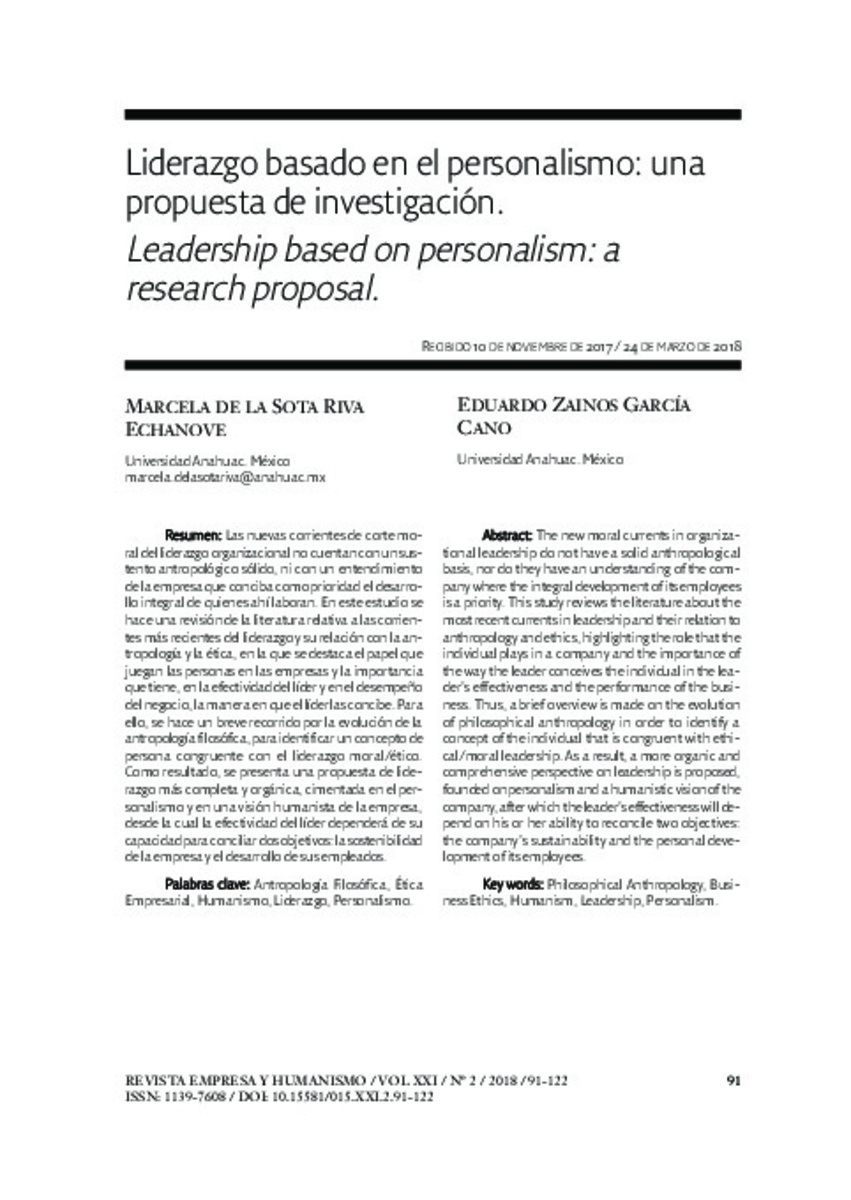Full metadata record
| DC Field | Value | Language |
|---|---|---|
| dc.creator | Sota-Riva-Echánove, M. (Marcela) de la | - |
| dc.creator | Zainos-García-Cano, E. (Eduardo) | - |
| dc.date.accessioned | 2018-07-10T10:03:11Z | - |
| dc.date.available | 2018-07-10T10:03:11Z | - |
| dc.date.issued | 2018 | - |
| dc.identifier.citation | Sota-Riva-Echánove, M. (Marcela) de la; Zainos-García-Cano, E. (Eduardo). "Liderazgo basado en el personalismo: una propuesta de investigación". Revista Empresa y Humanismo. 21 (2), 2018, 91 - 122 | es |
| dc.identifier.issn | 1139-7608 | - |
| dc.identifier.uri | https://hdl.handle.net/10171/53254 | - |
| dc.description.abstract | Las nuevas corrientes de corte moral del liderazgo organizacional no cuentan con un sustento antropológico sólido, ni con un entendimiento de la empresa que conciba como prioridad el desarrollo integral de quienes ahí laboran. En este estudio se hace una revisión de la literatura relativa a las corrientes más recientes del liderazgo y su relación con la antropología y la ética, en la que se destaca el papel que juegan las personas en las empresas y la importancia que tiene, en la efectividad del líder y en el desempeño del negocio, la manera en que el líder las concibe. Para ello, se hace un breve recorrido por la evolución de la antropología filosófica, para identificar un concepto de persona congruente con el liderazgo moral/ético. Como resultado, se presenta una propuesta de liderazgo más completa y orgánica, cimentada en el personalismo y en una visión humanista de la empresa, desde la cual la efectividad del líder dependerá de su capacidad para conciliar dos objetivos: la sostenibilidad de la empresa y el desarrollo de sus empleados. | - |
| dc.description.abstract | The new moral currents in organizational leadership do not have a solid anthropological basis, nor do they have an understanding of the company where the integral development of its employees is a priority. This study reviews the literature about the most recent currents in leadership and their relation to anthropology and ethics, highlighting the role that the individual plays in a company and the importance of the way the leader conceives the individual in the leader’s effectiveness and the performance of the business. Thus, a brief overview is made on the evolution of philosophical anthropology in order to identify a concept of the individual that is congruent with ethical/ moral leadership. As a result, a more organic and comprehensive perspective on leadership is proposed, founded on personalism and a humanistic vision of the company, after which the leader’s effectiveness will depend on his or her ability to reconcile two objectives: the company’s sustainability and the personal development of its employees. | - |
| dc.language.iso | spa | - |
| dc.publisher | Servicio de Publicaciones de la Universidad de Navarra | - |
| dc.rights | info:eu-repo/semantics/openAccess | - |
| dc.subject | Antropología Filosófica | - |
| dc.subject | Ética Empresarial | - |
| dc.subject | Humanismo | - |
| dc.subject | Liderazgo | - |
| dc.subject | Personalismo | - |
| dc.subject | Philosophical Anthropology | - |
| dc.subject | Business Ethics | - |
| dc.subject | Humanism | - |
| dc.subject | Leadership | - |
| dc.subject | Personalism | - |
| dc.title | Liderazgo basado en el personalismo: una propuesta de investigación | - |
| dc.title.alternative | Leadership based on personalism: a research proposal | - |
| dc.type | info:eu-repo/semantics/article | - |
| dc.identifier.doi | 10.15581/015.XXI.2.91-122 | es_ES |
| dadun.citation.endingPage | 122 | - |
| dadun.citation.number | 2 | - |
| dadun.citation.publicationName | Revista Empresa y Humanismo | - |
| dadun.citation.startingPage | 91 | - |
| dadun.citation.volume | 21 | - |
| dc.date.updated | 2018-07-10T10:03:11Z | - |
| dc.description.version | Peer Reviewed | - |
Files in This Item:
Statistics and impact
Items in Dadun are protected by copyright, with all rights reserved, unless otherwise indicated.






